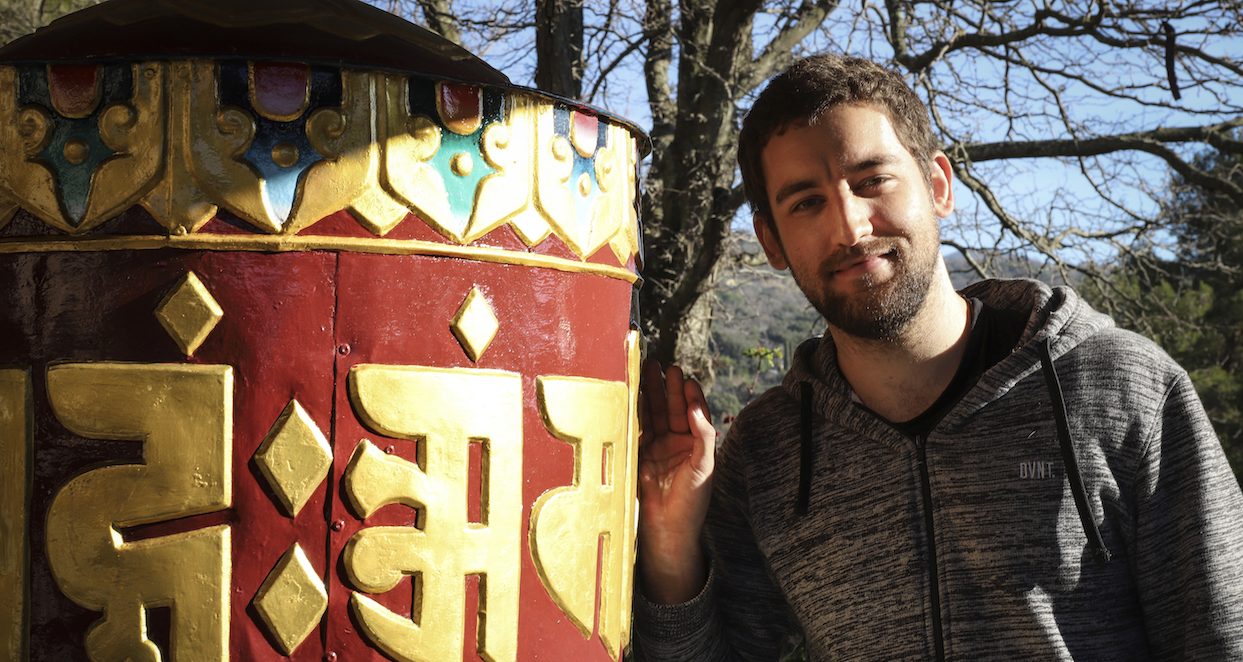Marko form Australia: One day in the life of a Basic Program student at the ILTK
It has been already one semester since the Basic Program started at the Institute Lama Tzong Khapa. As the second semester begins with the subject of “Tenets” and the daily schedule steadily unfolds, we decided to follow one of our students through a full day and get an insight into his life as a student in the Institute.
Marko is one of the youngest residents students in the Basic Program. He is only 23 years old and he came all the way from Australia in order to follow the studies.
Tell us a little bit about yourself, Marko. What made you decide to come to study the Basic Program at the ILTK?
I decided to come and study at ILTK after realizing how strong my connection with the Dharma was when I first set foot in ILTK on April 1st, 2017. I wouldn’t have been able to come this far without my mother, she invited me to volunteer for eight weeks from April to May whilst she was doing the 2017 Alan Wallace Shamata Spring retreat. I wanted to study something beyond myself and deeper than Western philosophy, to learn the way of mind, consciousness and how things work together, from all different points of view. One of the main things which motivated and inspired me was attending most of the Lama Zopa 2017 “Mani” Retreat. Being in the presence of a highly realized and liberated being was quite moving and a new experience for me. I took Buddhist refuge here at ILTK and changed significantly over time. I became more grounded and my head wasn’t in the clouds,
going astray anymore. During my time here at ILTK during 2017 and 2018, I also from time to time attended the Basic Program and the Master Program teachings when I had time. Just from the start when the opening prayers were chanted it was more than enough to keep me interested in Buddhist philosophy and psychology.
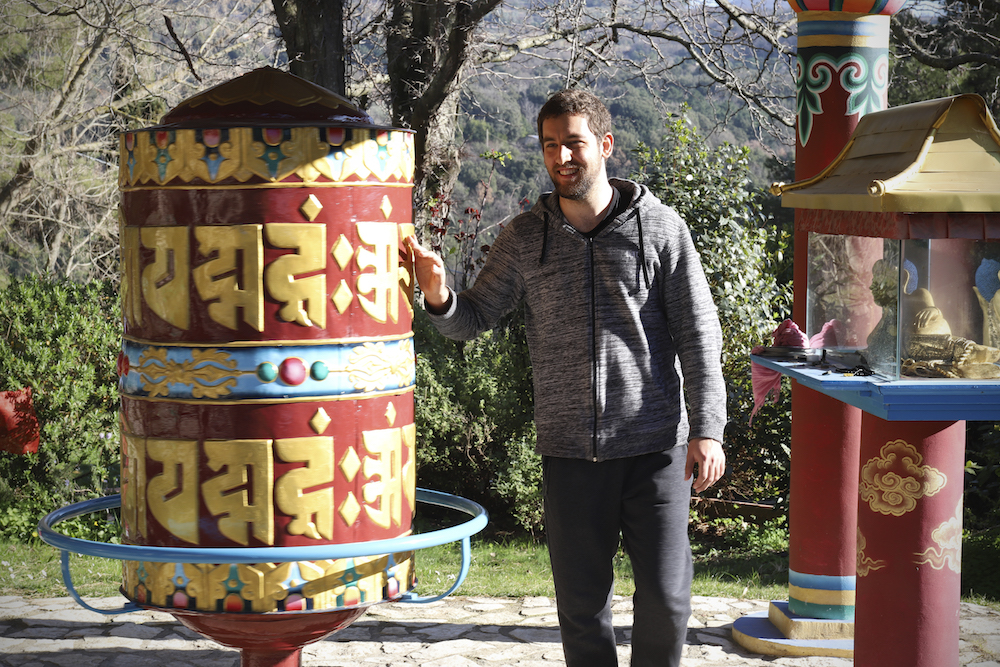
You’re already in the second semester of studies. How would you describe your experience of the program so far?
The experience of the program itself is wonderful, there has been quite a variety of mentalities and emotions, ranging from happiness, sadness, confusion and slowly accepting the fact that it takes more than a few months to understand each module regardless of how frequently I study. I still struggle to comprehend the concise text that we are given but the constant reminder from our teacher, Geshe Tenphel, to keep creating good motivation, is a beautiful blessing. As important it is for one to sharpen their knowledge, intelligence, memory and speech, we must not forget the heart. Even living here at ILTK can be challenging at times but we need these difficulties to grow and develop into a person that can learn to love other humans and sentient beings. Ethics and non-violent behavior are quite paramount to our daily attitude and way of thinking. This program can be too much for some since some students have already left and are not returning. However, a big part of the Basic Program itself is also meeting and creating new relationships, connections that are beautiful. To live and suffer from this community is for me, a rare and fortunate opportunity and I have no regrets of it. Using Lo Rig, Mind and Cognition and Mental Factors has been a wonderful experience to understand me better.
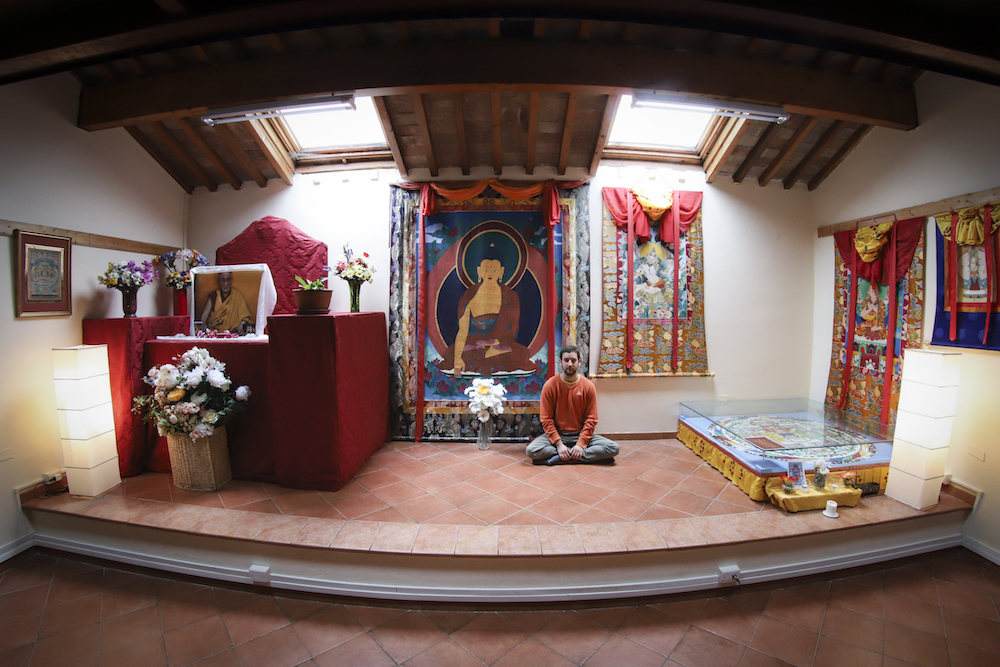
Put into a few words your personal schedule of a full day of the BasicProgram.
From Monday to Friday:
7am-Wake up and do my personal practice.
8am-Breakfast and relaxation
9 am- Prepare the mind with some chanting
9:30 am- Basic Program meditation
10 am – Contemplation on my meditation progress and preparation for Review Class
10:30 am – Review class with Basic Program community and studying material from the teachings
12:30 pm – Lunch
1:30 pm – Enjoy the ILTK atmosphere and go for a short walk around the Institute.
2:00 pm – Rest in my room and prepare for class
2:45 pm – Go to class and prepare for the teachings
2:55 pm – Go to greet Geshe Tenphel and walk to the Gompa with him
3pm-5pm – Attend teachings
5:10pm-6pm – Go for a walk to enjoy the sunset and process the teachings and clear the mind.
6:05 pm – Study review class notes and extract information to understand the text.
7 pm – Do some exercise and work out
7:30 pm – Have dinner with friends
8:30 pm – Study again for a short while
9:45 pm – Have some tea and socialize with people whilst keeping the Dharma in mind
11 pm – Sleep
What’s your favorite moment of the day and why?
My favorite moment of the day is to do morning meditation and then go have some tea on the bench because I am lucky enough to have this chance and work on my mind and think about how I can help sentient beings.
We start the day with a Lam rim meditation. How do you feel that the various topics brought about in meditation influence you throughout the day? Can you give a specific example?
I feel that we are being led by great practitioners who have experience in these big topics and remind us of how to be grateful and not taking things for granted. An example of this would be when our tutor, Joan, tells us during the conclusion of the meditation to dedicate the merits to our precious Mahayana teachers, wish a long healthy life for them and for all precious sentient beings to be free from suffering and attain genuine happiness.
What is it about the daily meditation sessions that you find most beneficial?
That no matter how difficult things may become, we are all in this together and the reminder that every day is a precious gift which allows us to help others.
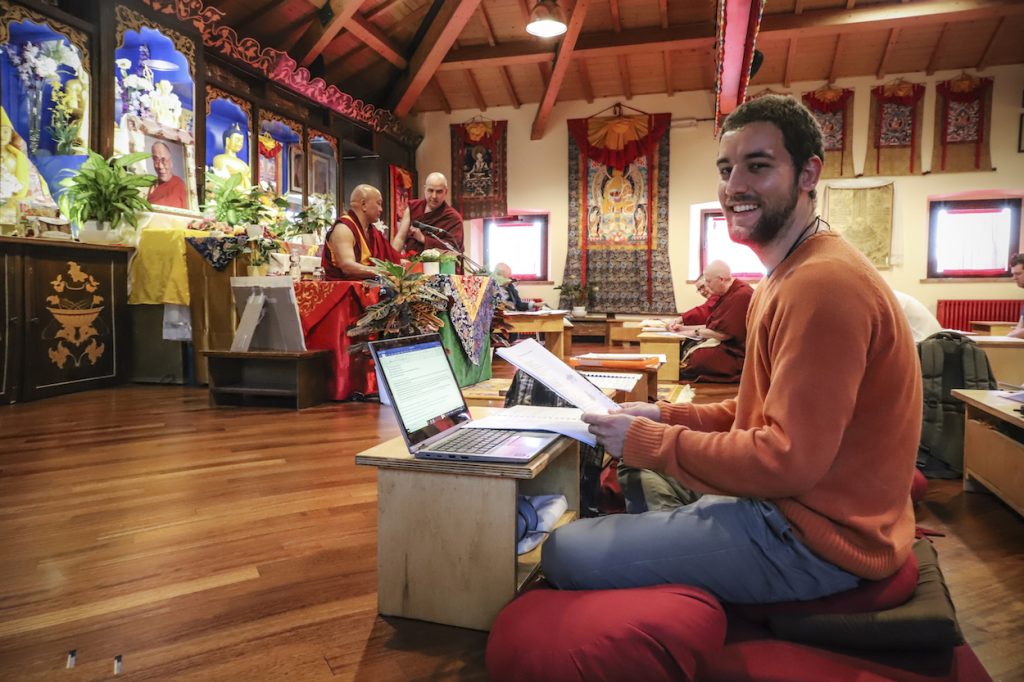
After meditation, we have either the review class or the discussion groups. Today we had the review class. Can you tell us a bit about it? How does it unfold for you?
The review class that we had was unfolding in a great way which allowed us to create great motivation whilst practicing mindfulness and to be together ingroups where people can help one another. When we do these classes, the atmosphere is different, we make jokes and laugh but also help one another with terminologies, references, and memorization. No time is wasted since the main focus is to learn and share. Doing the quizzes together in preparation for the exam is the main goal.
In what ways are the review classes helpful for strengt hening your knowledge of the subjects?
Having knowledge which is strengthened can reinforce your ways of thinking. To keep investigating, researching, talking about things you have doubts about. If a person is sure that something is viewed in a certain way from a specific system, then they can ask if their point of view is right or wrong. The review classes can both eliminate the question marks and help you or it can create new ones which lead to a deeper understanding.
In terms of the study we are doing, how would you state the difference between the review class with our tutor, Joan, and the teachings with Geshe Tenzin Tenphel?
The study with Geshe Tenphel is quite intense and in-depth, depending on how far he wants to go into consideration for the students’ knowledge and experience for Buddhist Philosophy and Psychology. However that being said, time in the Gompa is different from that in the review room, Sala Mandala. In the Gompa, we examine and analyze what is given to us by the education office and the creators of the Basic Program. This is coming from a Tibetan and Monastic point of view that is specifically designed to penetrate through the ignorance and unknowing of the mind. For the Sala Mandala reviews, we come together from different parts of the world and different mentalities so we can unite and learn together whilst being taught by someone who has already done two Basic Programs

The midday break is lunchtime at the Institute and about one hour of spare time before the teachings. How do you usually spend this spare time?
In this spare time, I spend it to see some people that I haven’t seen in a while since I was busy or just doing some circumambulations and kora. I also try to help people if they need it. Enjoying the sunshine for a short while. Mainly I am resting on my bed for a nap before class or listening to some chanting to clear the mind and any negative obscurations.
What is your favorite dish at the Institute made by our cook, Aldo?
I don’t have a specific, favorite meal. However, the meals he serves to the people made with a calm mind and a loving heart is the one that tastes the best.
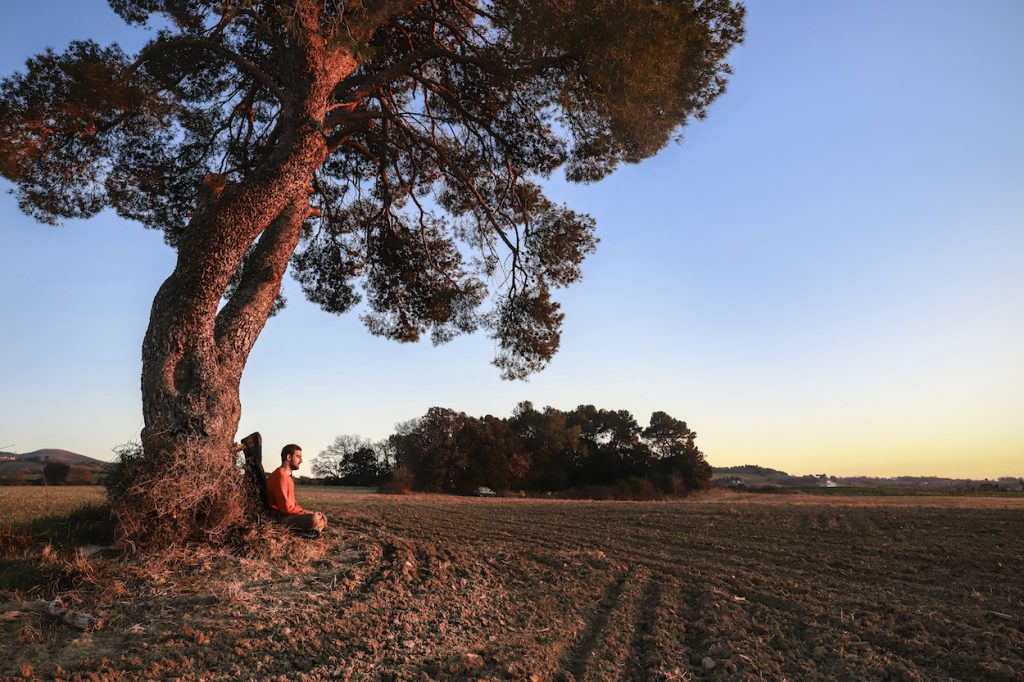
At 15:00 until 17:00 we have teachings with Geshe-la. This semester’s subject is Tenets and we’re more than half way through it. Tell us a few things about your experience of the teachings with Geshe-la.
I cherish every moment possible with our precious teacher, Geshe Tenzin Tenphel with whom I have a great connection. We became friends before we created the teacher-student relationship. We have a lot in common, especially knowing what it’s like to escape a country due to times of difficulties and violence. The younger one is, the harder trauma impacts them since there is less understanding of the situation. I feel as if I have learned a lot from him in and out of the Gompa/Mandala. In terms of his specific Tenets teachings, they are going quite well and he seems to be content with how he is teaching us with his own rhythm and method. I feel as if I’m really learning from someone who cares about helping others from a good heart and not out of seeking fame, wealth or status. Tenets are more difficult than Lo Rig for me but there is no pressure from Geshe-la to be a perfect student who has to do everything in a certain way.
13. How does one session of teachings normally unfold?
The sessions usually unfold in a way which makes you happy to learn in this Dharma center without regrets. They are detailed and require one to be patient with the delay of translations, however, some use this as a small window of opportunity to edit notes and read back on something they didn’t understand in the text. We do the opening prayers, then Geshe-la gives us advice on the importance of good motivation for attending the teachings. He can sometimes give advice in English and make us laugh, all in all, Geshe-la goes on with the text from Tibetan to the Italian translator which is translated into English by a second translator.
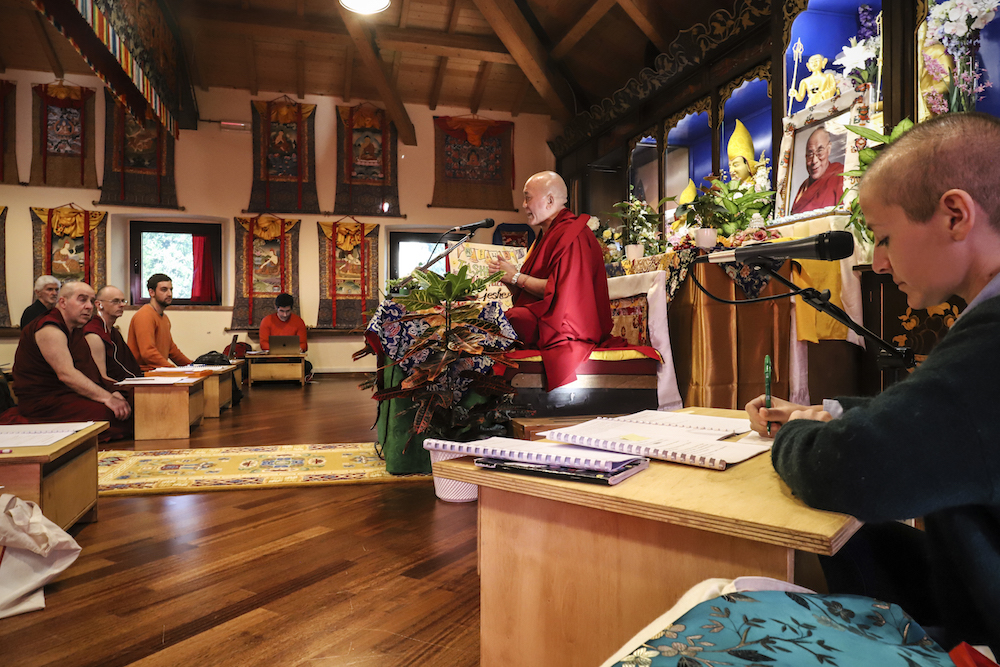
From 17:00 onward there’s a lot of free time in the schedule. How do you use this portion of spare time?
I usually go out for a walk to clear my head, enjoy the sunset and take in some fresh air. When I return, I do my best to study and understand whatever I can, even if only a handful. A lot of this free time is spent contemplating and reflecting on my behavior as a person and student. How I treat people and communicate with them after the teachings feel like an important and valuable test. Geshe-la told us that the Buddhas are always watching, even if we think we can do whatever we like when we’re alone.
How do you personally balance out your spare time with the time you dedicate for your studies?
I really try my best to help others, not to say I go around asking people I know if they need help with something every few minutes, but rather to accumulate merits and build my character. As for my studies, although I’m not always reading something in my spare time. I remove the theory for the time being and focus on the practice. Finding ways to use Lo Rig in everyday life and apply it to others in a positive way. The studies are the tools which help someone focus on the destination and journey, but the practice is what helps you put one foot in front of the other to reach your destination.
Overall, would you say that your experience of the Basic Program is a transformative one for you? If so, in what ways?
Without a shred of a doubt. The Basic Program has allowed me to stay in a place where I have found Gurus, friends and created a family that has lifted me up in times of negativity and depression. It has transformed me into something that is more of a spiritual being having a human experience than as a person who thinks about the “I” or other mundane things which don’t exist. I’m a straightforward character that can be intense at times, but my intentions are to help and become better so that my studies and wisdom can be used to help others. Even the person who wrote these questions and asked me to answer them has helped me immeasurably, I just hope that they realize it to the fullest extent.
Photos and text by Ioana Branisteanu
Supervision and editing by Manuela Ferro
